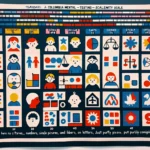The Columbia Mental Maturity Scale (CMMS) is a well-recognized psychological test designed to assess the cognitive development of children between the ages of 3 and 10. First developed in the mid-20th century by Dr. Burgemeister and colleagues, the test has been widely utilized by psychologists, educators, and other professionals involved with pediatric development. The CMMS is an effective tool for determining a child’s mental maturity level by presenting a series of item problems that measure general reasoning ability.
### Understanding the Columbia Mental Maturity Scale
The CMMS is structured in a way that focuses on the child’s ability to solve problems without relying on language skills, making it notably advantage for children who may have speech, language, or hearing impediments. It is also considered culturally fair, as the test requires minimal verbal instruction and largely consists of pictorial content, reducing the potential for cultural or linguistic bias.
The test comprises a series of items that increase in difficulty as the child progresses. In each item, children are shown a picture with a part missing or a series of pictures that create a sequence and are asked to select the answer that best completes the picture or series. The simplicity of the test’s design belies the complexity of cognitive abilities it measures, including attention, concentration, visual perception, and reasoning.
### Applications of the CMMS
One of the main applications of the Columbia Mental Maturity Scale is in the educational setting. It helps educators to better understand a student’s cognitive strengths and weaknesses. This insight allows teachers to tailor learning approaches and provide appropriate interventions for children who may require additional support in their cognitive development. For example, a student struggling with problem-solving may benefit from targeted activities that stimulate logical thinking and reasoning skills.
Furthermore, the test is an important tool for clinical psychologists and pediatricians. In the clinical setting, the CMMS aids in the evaluation and diagnosis of various developmental delays and intellectual disabilities. It also contributes to the planning and assessment of individualized care plans and can be used to track a child’s developmental progress over time.
In some instances, the CMMS may be used as part of the assessment process for gifted programs. Children who demonstrate significantly higher mental maturity levels than their peers may be eligible for specialized educational opportunities that address their advanced cognitive abilities.
### Reliability and Validity of the CMMS
The validity and reliability of the Columbia Mental Maturity Scale are well established through extensive research and use over the decades. The CMMS has been shown to have high internal consistency and test-retest reliability, which means that the test is stable over time and provides consistent results across administrations.
In terms of validity, studies have confirmed that the CMMS correlates with other measures of cognitive ability, such as the Wechsler Intelligence Scale for Children (WISC). This suggests that the CMMS is an effective measure of the general cognitive development that it aims to assess.
### Administering the CMMS
The administration of the Columbia Mental Maturity Scale is user-friendly and does not require extensive training. The test can usually be completed in 15 to 30 minutes, making it a practical choice for both clinical and classroom settings. Scoring is straightforward, with each item being scored as either correct or incorrect, and an overall score is calculated based on the number of items answered correctly.
It is recommended, however, that the CMMS be administered and scored by individuals with some background in psychological or educational testing. By ensuring that professionals are involved, the accuracy of the test interpretation and the subsequent recommendations made for the child can be greatly enhanced.
### Interpretation of CMMS Results
The results of the CMMS offer a snapshot of a child’s mental maturity. Scores are typically interpreted in relation to age norms, which allows for the comparison of a child’s performance to that of their peers. This comparison helps in identifying any significant deviations from the expected cognitive developmental milestones.
While the raw score provides immediate information, the CMMS also generates standard scores and percentiles. These scores allow for a broader interpretation of the child’s cognitive abilities and can be particularly useful when comparing with other standardized assessments.
### Considerations and Limitations
While the Columbia Mental Maturity Scale is a valuable tool, it is important to take into consideration its limitations. Since the CMMS focuses on non-verbal problem-solving skills, it is not designed to assess other important domains of child development, such as emotional or social maturity. Therefore, it is often used in conjunction with other assessments for a more comprehensive evaluation.
Moreover, it is important to avoid relying solely on the CMMS or any single test when making decisions about a child’s education or clinical care. Observations, reports from teachers or parents, and other assessments should be used together to inform decisions.
### Conclusion
The Columbia Mental Maturity Scale remains a relevant and effective assessment tool for measuring the cognitive development of young children. By providing insights into a child’s mental maturity, the CMMS plays a crucial role in identifying needs, guiding educational strategies, and supporting clinical interventions. Mental health professionals, educators, and researchers continue to rely on this robust tool to help ensure that children are given the opportunities and support they need to reach their full potential.
For parents and educators looking to understand or support a child’s cognitive development, utilizing the Columbia Mental Maturity Scale can be an important step in ensuring that every child is valued for their unique abilities and receives the care and attention necessary for their individual growth and learning.

